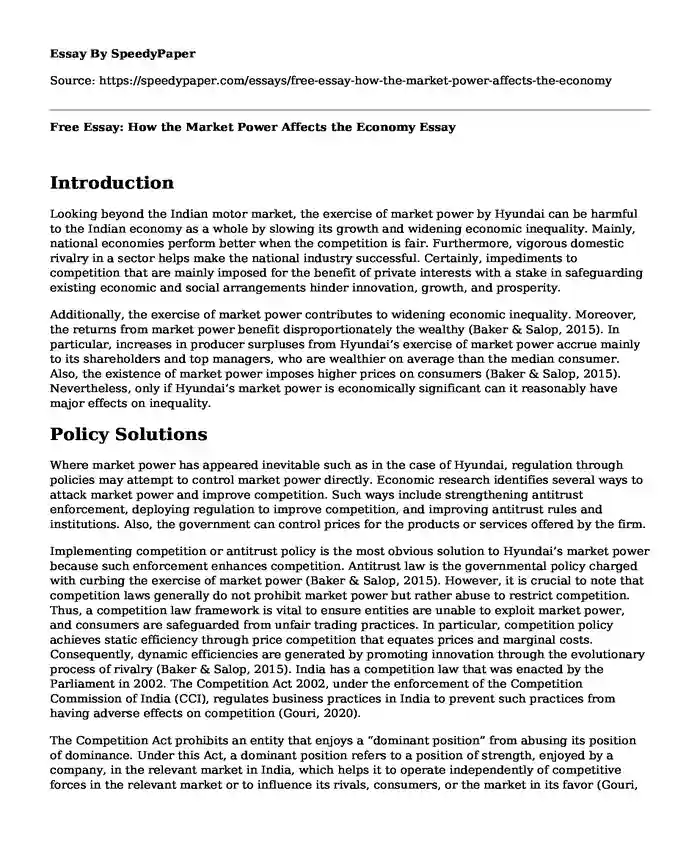Introduction
Looking beyond the Indian motor market, the exercise of market power by Hyundai can be harmful to the Indian economy as a whole by slowing its growth and widening economic inequality. Mainly, national economies perform better when the competition is fair. Furthermore, vigorous domestic rivalry in a sector helps make the national industry successful. Certainly, impediments to competition that are mainly imposed for the benefit of private interests with a stake in safeguarding existing economic and social arrangements hinder innovation, growth, and prosperity.
Additionally, the exercise of market power contributes to widening economic inequality. Moreover, the returns from market power benefit disproportionately the wealthy (Baker & Salop, 2015). In particular, increases in producer surpluses from Hyundai’s exercise of market power accrue mainly to its shareholders and top managers, who are wealthier on average than the median consumer. Also, the existence of market power imposes higher prices on consumers (Baker & Salop, 2015). Nevertheless, only if Hyundai’s market power is economically significant can it reasonably have major effects on inequality.
Policy Solutions
Where market power has appeared inevitable such as in the case of Hyundai, regulation through policies may attempt to control market power directly. Economic research identifies several ways to attack market power and improve competition. Such ways include strengthening antitrust enforcement, deploying regulation to improve competition, and improving antitrust rules and institutions. Also, the government can control prices for the products or services offered by the firm.
Implementing competition or antitrust policy is the most obvious solution to Hyundai’s market power because such enforcement enhances competition. Antitrust law is the governmental policy charged with curbing the exercise of market power (Baker & Salop, 2015). However, it is crucial to note that competition laws generally do not prohibit market power but rather abuse to restrict competition. Thus, a competition law framework is vital to ensure entities are unable to exploit market power, and consumers are safeguarded from unfair trading practices. In particular, competition policy achieves static efficiency through price competition that equates prices and marginal costs. Consequently, dynamic efficiencies are generated by promoting innovation through the evolutionary process of rivalry (Baker & Salop, 2015). India has a competition law that was enacted by the Parliament in 2002. The Competition Act 2002, under the enforcement of the Competition Commission of India (CCI), regulates business practices in India to prevent such practices from having adverse effects on competition (Gouri, 2020).
The Competition Act prohibits an entity that enjoys a “dominant position” from abusing its position of dominance. Under this Act, a dominant position refers to a position of strength, enjoyed by a company, in the relevant market in India, which helps it to operate independently of competitive forces in the relevant market or to influence its rivals, consumers, or the market in its favor (Gouri, 2020). The Competition Act provides a list of practices that amount to an abuse of dominance. Hyundai’s RPM and tie-in arrangement were clear examples of anti-competitive practices of setting unfair conditions on the sale of goods and indulging in business practices that led to the denial of market access. Through the Competition Act, the CCI can use its fining powers to prescribe penalties on Hyundai, and hence, minimize its market power and improve competition in the motor industry in India.
Pricing policies that include external reference pricing (ERP) and price controls are another solution that the Indian Government can use to combat Hyundai’s market power. Primarily, in price controls, the government may control the company’s margin or its retail price. Conversely, under the ERP policy, the price that India permits Hyundai to charge in its market depends upon its prices in a well-defined set of comparable countries, which refers to its reference basket. Additionally, setting a price cap for Hyundai’s products can also serve as a solution to its market power. Mainly, a price cap simply sets a maximum permitted inter-temporal path for the price of a specific good or service. For instance, the price of a specific spare part in any given year may be capped at a level, that changes over time in response to a price index that is exogenous to Hyundai, and a factor set in advance by CCI. However, since the firm produces multiple products, all its products may be bundled together in the price cap, which may automatically adjust for exogenous variations in various prices that have strong implications for the firm’s profitability.
The basic objective of restrictive trade practices and pricing regulations is to promote and preserve competition, which is likely to foster greater economic efficiency. Such efficiency is characterized by efficient organization of production and distribution within firms, efficient allocation of resources, and innovativeness of entities and their responsiveness to change. Additionally, competition can benefit consumers. Therefore, there is a need to rethink market intervention by CCI from the perspective of public interest. Furthermore, it is a political concept defined in terms of the well-being of the public, which emerges as an economic concept.
References
Baker, J. B., & Salop, S. C. (2015). Antitrust, competition policy, and inequality. Geo. LJ Online, 104, 1, 1-28. https://digitalcommons.wcl.american.edu/cgi/viewcontent.cgi?article=2125&context=facsch_lawrev
Gouri, G. (2020). Convergence of competition policy, competition law, and public interest in India. Russian Journal of Economics, 6, 277. https://rujec.org/article/51303/download/pdf/
Cite this page
Free Essay: How the Market Power Affects the Economy. (2024, Jan 03). Retrieved from https://speedypaper.net/essays/free-essay-how-the-market-power-affects-the-economy
Request Removal
If you are the original author of this essay and no longer wish to have it published on the SpeedyPaper website, please click below to request its removal:
- Essay Sample Exploring Types of Contingencies and Contract Planning
- Essay Sample about Organized Crimes in the United States
- Essay Sample on Social Media and Business Enlargement
- Essay Sample on Cruzan v. Director, Missouri Department of Health, 497 U.S. 261 (1990)
- Essay Example - The Seizure of Electronic Evidence
- Free Essay Sample on Reasons Why You Should Not Shoplift
- Epic Systems Corp. v. Lewis: Employees Can Seek Litigation for Labor Claims - Paper Example
Popular categories





